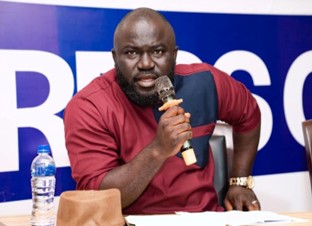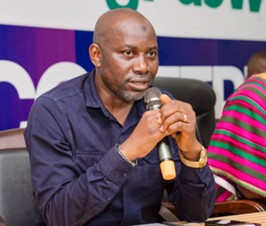
By Millicent Senava Mannah
The Ministry of Information and Civic Education on Tuesday 2nd September, 2025, hosted its weekly government press conference, offering updates on national priorities ranging from diplomacy and public sector reform to anti-corruption, education, and civil society perspectives. The event, held in Freetown, featured Deputy Minister of Information and Civic Education Bocakarie Abdel-Aziz Bawoh, the Minister of Public Administration and Political Affairs Amara Kallon, representatives from the Anti-Corruption Commission (ACC), the Free Quality School Education (FQSE) Secretariat, and civil society leaders.
Deputy Minister Bawoh updated the public on the recent visit of a 12-member ECOWAS delegation to Sierra Leone on August 26, 2025. The mission, led by Dr. Odigie Brown, ECOWAS Program Officer for Mediation, was tasked with conducting an impartial and inclusive assessment of the longstanding border dispute between Sierra Leone and Guinea over Yenga.
Bawoh stressed that the government remains committed to a diplomatic resolution, warning that military confrontation would only escalate tensions. He confirmed that the delegation engaged with Sierra Leonean authorities and stakeholders as part of its fact-finding mission, with recommendations expected to be submitted to ECOWAS Heads of State.
Deputy Minister Bawoh also announced a groundbreaking partnership between Sierra Leone and Columbia University, one of the United States’ Ivy League institutions. The Memorandum of Understanding (MoU), signed on August 27 by Information Minister Chernor Bah and Professor Thoai Ngo of Columbia’s Heilbrunn Department of Population and Family Health, establishes a framework for collaborative research, training, and policy engagement in Sierra Leone. Officials described the MoU as a transformative step in linking global expertise with national development priorities.
Minister of Public Administration and Political Affairs Amara Kallon outlined sweeping reforms to modernize Sierra Leone’s public service. Among the highlights was the drafting of the country’s first-ever Public Service Policy and Act, designed to strengthen coordination and efficiency across government institutions. The upcoming national constitution will feature a dedicated chapter on public service, with the Act expected to be finalized before the end of 2025.
Minister Kallon also unveiled a partnership with Humnce, a local IT firm, to build a digital Human Resource Hub that will replace manual systems with a centralized digital platform for attendance, appraisals, transfers, and promotions.
In a move to improve the welfare of civil servants, the Ministry signed an MoU with the Economic and Commercial Counseling Center of the Sierra Leone Embassy in Guangzhou, China, to provide low-cost housing and electric vehicles on loan schemes for public servants. Kallon said the initiative demonstrates President Julius Maada Bio’s commitment to effective service delivery.
He further announced that Sierra Leone will host over 700 human resource professionals and experts from Africa and the Global South at the Bintumani Conference Center from November 4–6, 2025.
Patrick Sandi, ACC Coordinator of Operations, reaffirmed the Commission’s determination to tackle corruption. He noted that the 2019 amendment to the 2008 Anti-Corruption Act strengthened the institution’s mandate and aligned its operations with the government’s Medium-Term National Development Plan and the “Big Five Changers.”
Since 2018, the ACC has carried out more than 20 corruption risk assessments, resulting in 461 recommendations, of which 73 percent have been implemented by Ministries, Departments, and Agencies (MDAs). Sandi also reported improved compliance with asset declaration requirements, supported by digital upgrades to the online declaration portal.
On specific investigations, he disclosed that the Minister of Social Welfare, Melrose Karminty, has been cleared of all allegations after a thorough probe, while former Chairman of the National Commission for Persons with Disabilities, Dr. Vandy Konneh, remains under investigation.
National Program Coordinator Augustine Moses Koroma gave a comprehensive update on the Free Quality School Education (FQSE) program. He confirmed that all five of the initiative’s core commitments, payment of school fees, coverage of public exam fees, provision of core textbooks, distribution of learning materials, and expansion of school feeding, have been delivered since its launch in 2018.
Additional milestones include the approval of 3,000 schools, recruitment of 12,000 teachers, and distribution of 94 containers of learning materials. Infrastructure has expanded significantly, with 538 primary schools built or renovated and 367 expansions completed. Enrollment has surged from 37 percent to 85 percent, while education expenditure and teacher salaries have seen substantial increases.
Adding a civil society voice, Mariama Khai Fornah, CEO of Moving Women for Sustainable Development Sierra Leone, praised the government’s achievements under the FQSE program, particularly its impact on female education. She noted that policies such as Radical Inclusion, school feeding, and the construction of new schools have driven record numbers of girls into classrooms, with many now excelling in public examinations.
The weekly press briefing reflected government’s broad reform agenda, from advancing regional diplomacy and strengthening governance systems to improving education outcomes and fighting corruption. Officials reiterated that these efforts are central to Sierra Leone’s long-term stability and development.


